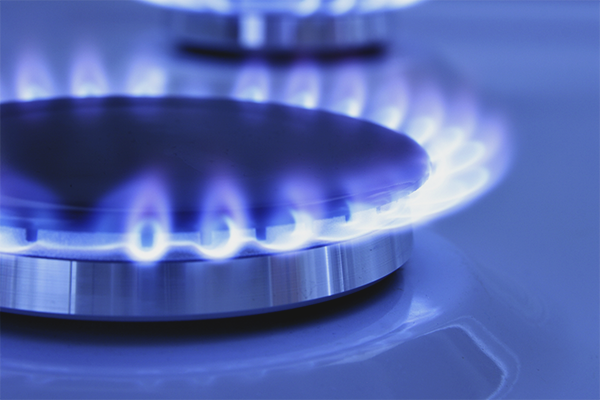The content of the article
Modern heating systems are pleased with their compactness and power. But despite this, gas bills are growing, more and more upsetting the owners of private houses. It is believed that using blue fuel is much more profitable than electricity. Many prefer gas boilers as more economical and practical. But often, gas bills do not seem to be economical at all. To reduce gas costs and learn how to save on blue fuel, you need to know a few subtleties and nuances.
Often, the question of gas savings arises only in private buildings. In apartment buildings, gas is used only for cooking. It is quite difficult to convert a house completely to gas heating. In addition to the impressive equipment, you will need to legitimize the gasification process, which is problematic.
The main articles of using gas in a private house are a gas stove for cooking, a heating system and a hot water supply system.Worst of all it turns out to save on a gas stove - you will not cook less? In addition, the use of gas there is minimal (depending on the remaining points of consumption). Here we can advise not to leave the included burner for a long time to work, and also not to open the gas valve too much. In addition, you can prepare food for the future for several days (especially if the family is large), as well as use dishes with a wide bottom (it warms up better). In other cases, the field for saving is much more extensive.
How to save gas on hot water
There are two types of boilers for heating water. The first is cumulative. Water is stored in it in a large tank with a capacity of 30 to 200 liters (depending on the needs). The gas heats up the tank, and when you need it, you will simply use heated hot water. If the water is not used, the water heater from time to time warms it up, periodically switching on and off by means of automation.
The second type of heaters is flow through. It is arranged in such a way that the water is heated in the pipe, as needed. That is, you turned on the water, the water heater automatically turns on immediately, which heats the water directly along its course in the pipe.The instantaneous water heater, unlike the storage one, does not take up much space and is much more economical. After all, it turns on only when necessary, without spending gas in the rest of the time. However, the flow heater also has a drawback - it heats the water to a moderately warm temperature. You can get very hot water only through the cumulative boiler. To use a flowing water heater instead of an accumulative one - the first way to save on gas.
If you want to save, use a shower instead of a bath. In it, you spend less hot water, which leads to gas savings.
Another way to reduce the cost of using gas is to use a double-circuit boiler. The water in it is heated not only for the heating system, but also for hot water. So you sort of kill two birds with one stone. Use two services, and pay one.
How to save gas on heating
This is the largest expense in any private home. After all, every owner wants his house to be warm, comfortable and cozy. And often ready to pay for this comfort a lot of money.You do not have to pay fabulous sums for gas every time. Some of our tips will help you reduce this cost item at times, without losing the home heat.
- Thermal insulation. This is the most important condition under which heat (and therefore money) will not “fly off into the pipe.” A lot depends on the condition of the house. If there are many gaps in the structure, the walls are thin, and the windows are installed incorrectly, no matter how thick the house is, it will not be warmer. It is very important to make a competent thermal insulation of the walls, foundation and roof. For this purpose, modern sandwich panels, stone wool, foamed polymers are used. Experienced builders will help to analyze heat loss and minimize them.
- Window. Window openings are also a source of great heat loss. There are two ways to fix this. The first is to initially install smaller windows when building a house. However, this way of solving the problem is unlikely to please anyone. Therefore, the second method is the installation of double and triple glazed windows. There are modern multi-window systems, the glass of which is covered with a thin film that reflects infrared rays. Such windows keep maximum heat in the house.
- Doors. Entrance doors must be insulated. With double doors, it is possible to save more heat, since there is an air cushion between the doors.
- Boiler and wiring heating pipes. If you are just thinking about the heating system in the house, you need to carefully approach the choice of power and volume of the heating boiler. Choose a boiler of small capacity - you will freeze, choose a too powerful boiler - you will have to constantly overpay. With an average ceiling height (not more than three meters), you need to calculate the required area in this way - one kW per 10 square meters of the heated house. It is very important to make competent layout of heat pipes, which is able to reduce gas consumption by 10-15%.
- Controlled heating system. When installing the heating system, take care of the collector distribution system of the coolant. It will help regulate the temperature in the house according to the parameters you need. That is, turn on and increase the heating in those rooms where you are now and do not waste gas on heating those rooms in which you are not there now. For example, during the day the living room is heated to a greater extent, and at night the bedroom.
- Automated sensors. These devices are designed to heat the house, while saving blue fuel. That is, depending on various indicators, the thermostat can change the heating force. For example, modern sensors work depending on the external temperature. If it's warm outside, gas water heaters work halfway, saving fuel. If it's cold outside, the house warms up much better. Such sensors allow you to turn on the heating of the house remotely. That is, if you are at work during the day, there is no need to heat the house and waste gas. When you leave work through a smartphone or computer, you connect a heating system that warms the house for your arrival. These are very smart and economical automated systems that quickly pay for themselves at the expense of impressive gas savings.
- Ventilation. Serious heat loss occurs through the ventilation pipes. Warm air comes out of the house, and cold air enters the house, which leads to the additional need to heat it. Reduce losses at this stage will help a special device recuperator. It consists of two pipes of different diameters.Hot air goes through the inner tube, and cold enters the gap between the two pipes, warming along the way.
- Warm floor. Today, warm floor is gaining its popularity not only due to the convenience and comfort. Heated floor allows you to heat the room much better than conventional radiators. At the same time the warm floor does not consume a lot of fuel, because it heats the water to a temperature of 60-70 degrees, and not 95, as in a battery. Such an alternative method of heating really deserves attention.
- Counter. If you still have not installed metering devices on gas pipes, do it as soon as possible. To pay for gas on the meter is much more profitable.
All these tips are quite expensive, since re-installing the heating system or changing the boiler will cost a lot. However, if the house is large and each time you lay out huge amounts of money for gas supply, this is a reason to think seriously. One qualitative redevelopment and revision of the water supply and heating system will quickly pay for itself - due to the impressive gas savings.
If you want to save on gas in a private house - do not save on gas equipment.Properly selected and installed system will not only significantly reduce costs and will quickly pay for itself, but will also give you warmth and comfort in your home. And what could be more beautiful than comfort when there are severe frosts outside?
Video: how to reduce gas consumption by up to 50%











To send